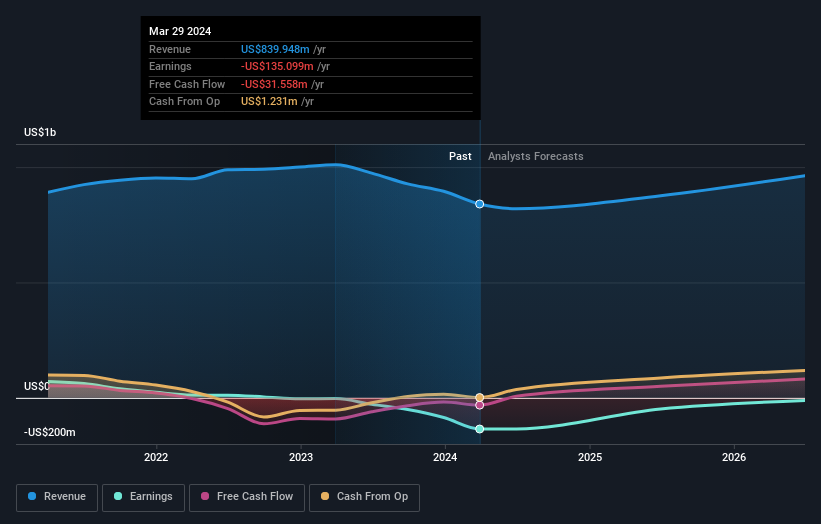Analyst Estimates: Here's What Brokers Think Of Mercury Systems, Inc. (NASDAQ:MRCY) After Its Third-Quarter Report
As you might know, Mercury Systems, Inc. (NASDAQ:MRCY) last week released its latest quarterly, and things did not turn out so great for shareholders. Revenues missed expectations somewhat, coming in at US$208m, but statutory earnings fell catastrophically short, with a loss of US$0.77 some 97% larger than what the analysts had predicted. The analysts typically update their forecasts at each earnings report, and we can judge from their estimates whether their view of the company has changed or if there are any new concerns to be aware of. We've gathered the most recent statutory forecasts to see whether the analysts have changed their earnings models, following these results.
View our latest analysis for Mercury Systems
Taking into account the latest results, the consensus forecast from Mercury Systems' nine analysts is for revenues of US$875.5m in 2025. This reflects a credible 4.2% improvement in revenue compared to the last 12 months. The loss per share is expected to greatly reduce in the near future, narrowing 63% to US$0.83. Before this latest report, the consensus had been expecting revenues of US$875.5m and US$0.78 per share in losses. So it's pretty clear consensus is mixed on Mercury Systems after the new consensus numbers; while the analysts held their revenue numbers steady, they also administered a pronounced increase to per-share loss expectations.
As a result, there was no major change to the consensus price target of US$25.50, with the analysts implicitly confirming that the business looks to be performing in line with expectations, despite higher forecast losses. Fixating on a single price target can be unwise though, since the consensus target is effectively the average of analyst price targets. As a result, some investors like to look at the range of estimates to see if there are any diverging opinions on the company's valuation. Currently, the most bullish analyst values Mercury Systems at US$33.00 per share, while the most bearish prices it at US$20.00. Analysts definitely have varying views on the business, but the spread of estimates is not wide enough in our view to suggest that extreme outcomes could await Mercury Systems shareholders.
One way to get more context on these forecasts is to look at how they compare to both past performance, and how other companies in the same industry are performing. We would highlight that Mercury Systems' revenue growth is expected to slow, with the forecast 3.4% annualised growth rate until the end of 2025 being well below the historical 7.0% p.a. growth over the last five years. By way of comparison, the other companies in this industry with analyst coverage are forecast to grow their revenue at 2.3% annually. Even after the forecast slowdown in growth, it seems obvious that Mercury Systems is also expected to grow faster than the wider industry.
The Bottom Line
The most important thing to note is the forecast of increased losses next year, suggesting all may not be well at Mercury Systems. Fortunately, they also reconfirmed their revenue numbers, suggesting that it's tracking in line with expectations. Additionally, our data suggests that revenue is expected to grow faster than the wider industry. There was no real change to the consensus price target, suggesting that the intrinsic value of the business has not undergone any major changes with the latest estimates.
Following on from that line of thought, we think that the long-term prospects of the business are much more relevant than next year's earnings. We have estimates - from multiple Mercury Systems analysts - going out to 2026, and you can see them free on our platform here.
It might also be worth considering whether Mercury Systems' debt load is appropriate, using our debt analysis tools on the Simply Wall St platform, here.
Have feedback on this article? Concerned about the content? Get in touch with us directly. Alternatively, email editorial-team (at) simplywallst.com.
This article by Simply Wall St is general in nature. We provide commentary based on historical data and analyst forecasts only using an unbiased methodology and our articles are not intended to be financial advice. It does not constitute a recommendation to buy or sell any stock, and does not take account of your objectives, or your financial situation. We aim to bring you long-term focused analysis driven by fundamental data. Note that our analysis may not factor in the latest price-sensitive company announcements or qualitative material. Simply Wall St has no position in any stocks mentioned.

